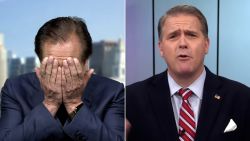The nine-page whistleblower complaint released Thursday morning amounts to pouring jet fuel on the already-raging fire of whether or not President Donald Trump sought to use his office to further his personal political agenda in a series of interactions between his administration and the Ukrainians.
Much of what is in the complaint is somewhat subjective and not based on firsthand knowledge, facts that could allow Republicans to poke holes in it as nothing more than a political hack job.
Notice, however, that I said “much” of the complaint fits into this category. Not “all” of the complaint. And not one set of facts – or alleged facts – in particular.
Here it is, in the words of the whistleblower, detailing the July 25 call between Trump and Ukrainian President Volodymyr Zelensky:
“In the days following the phone call, I learned from multiple US officials that senior White House officials had intervened to ‘lock down’ all records of the phone call, especially the official word-for-word transcript of the call that was produced – as is customary – by the White House Situation Room. This set of actions underscored to me that White House officials understood the gravity of what had transpired in the call.
“White House officials told me that they were ‘directed’ by White House lawyers to remove the electronic transcript from the computer system in which such transcripts are typically stored for coordination, finalization, and distribution to Cabinet-level officials.
“Instead, the transcript was loaded into a separate electronic system that is otherwise used to store and handle classified information of an especially sensitive nature. One White House official described this act as an abuse of this electronic system because the call did not contain anything remotely sensitive from a national security perspective.”
Wow.
Here’s why that allegation from the whistleblower matters SO much and has the potential to directly threaten Trump’s presidency:
1) If true, it makes clear that there was a concerted effort by the Trump White House to cover up the conversation because they knew that what Trump had said and done was so problematic. That’s a far cry from Trump’s description of the call as “perfect” and totally normal.
2) Either the transcript of the call is in the “computer system where such transcripts are typically stored” or it isn’t. Ditto the allegation that the transcript was put into a separate electronic system reserved for classified information. Where the transcript was placed is not a subjective judgment. And it is something that should be find-out-able.
Now, my guess is that if it turns out the transcript was placed in the electronic system for classified information, the Trump side’s pushback will be that it was done so because there was classified information in it. But that runs counter to the transcript of the call released by the White House on Wednesday and Trump’s repeated claims that the call was a total nothing-burger. (“You will see it was a very friendly and totally appropriate call,” he tweeted about it earlier this week.)
In short: The allegation in the whistleblower report of a coverup over the July 25 call between Trump and Zelensky matters so incredibly much not only because it alleges that forces within the White House knew how bad it was and acted to try to keep it from getting out. But also – and this is the truly important part – that there seems a high likelihood that there is an electronic paper trail that can either confirm (or not) the whistleblower’s claim.
If it is proven that the transcript of the call was purposely siloed – and the classified categorization was misused to keep the conversation from ever reaching the public – the Trump presidency could be genuinely imperiled. When it comes to a Senate impeachment trial, the political breakdown of the chamber is on Trump’s side, for now. But could this change that? We’re not there yet, but that coverup claim in the whistleblower’s report provides a roadmap of how we might end up there.






















